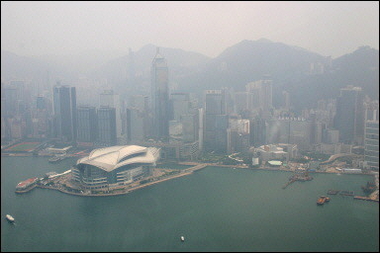Rising pollution and risks to health have tainted Hong Kong's lure, according
to a lifestyle survey that saw the Chinese territory plummet down a list of
expatriates' favourite cities.

An aerial view shows
the air pollution levels on Hong Kong island, September 2005. Rising
pollution and risks to health have tainted Hong Kong's lure, according to
a lifestyle survey that saw the Chinese territory plummet down a list of
expatriates' favourite cities.[AFP] |
Hong Kong came in at a lowly 32 in the world rankings of best places for
Asian expats to live, slipping from 20th on the survey by human resources
research company ECA International.
Rival Asian entrepot Singapore was considered the best place for overseas
Asian workers to be based, followed by Australian cities Sydney and Melbourne.
Western European expatriates placed the Chinese city even lower, ranking it a
derisory 66th behind Basle, Switzerland and the Danish capital Copenhagen at the
top two spots.
War-torn Iraqi capital Baghdad came out as the worst location to live,
followed by Kabul in Afghanistan and Karachi in Pakistan.
"Two primary concerns were raised against Hong Kong: its worsening pollution
and the perception that health risks were increasing," ECA general manager Lee
Quane told AFP.
"Air quality has become more important to expats over the past few years, and
it is especially noted by people who have lived in other cities as well as Hong
Kong," Quane added.
Rising industrialisation in China's neighbouring Pearl River delta, the
burning of coal by Hong Kong's huge power stations and exhaust fumes from the
city's creaking bus services have been blamed for a chronic rise in pollution
levels in recent years.
A recent study by Friends of the Earth Hong Kong found the city's airport
recorded one day of smog-related poor visibility in every 3.5 days last year, up
from one in eight in 2002.
This year's edition of the annual ECA International survey was the company's
largest, ranking 257 countries according to climate, natural disasters, health
facilities and risks, transportation, quality and availability of goods and
services, accommodation standards, education, recreation, crime and
socio-political climate.
Quane said that Hong Kong scored low on health issues, with outbreaks of
imported infectious disease such as Japanese encephalitis, illnesses connected
to poor food hygiene and the ever-present threat of bird flu also weighing
heavily on respondents' minds.
"Although the actual health risks in Hong Kong have not worsened, there is a
perception that they have," he said.
"It also suffers by association with health issues in China, such as recent
spills of poisons into local water supplies."
Quane said Hong Kong remained attractive to expatriates because of its low
crime rates, free governance and good recreational facilities.
These factors made it China's most attractive city, ahead of Shanghai, which
ranked 89th and Beijing, which ranked 106th.